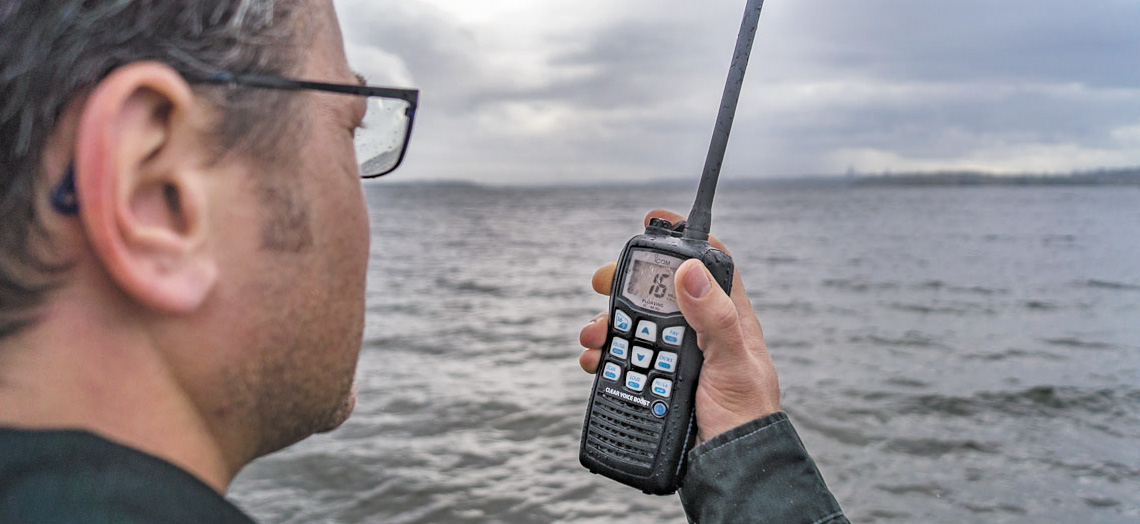“Mayday!”: A Rescue on the Potomac
by Icom America
“A little thing like a radio can save your life.” – Brad Stemocosky
A beautiful, calm day on the water can change to a dangerous situation in an instant. On December 20, 2015, Brad Stemocosky and a friend went fishing on Potomac River, near Chesapeake Bay. The two men were well-prepared for the trip, however a fierce turn in the weather as they tried to return home was too much for the 16-foot boat. As 3 1/2-foot waves swamped their vessel, Stemocosky was able to quickly send out a mayday with his handheld VHF radio.
Within 10 seconds the boat was gone.
The two men bobbled in the cold, 50-degree water for nearly an hour and an half. While the search helicopter circled above, Stemocosky was able to communicate with the Coast Guard, assisting the Search and Rescue team. The two men were safely pulled out of the water.
“No one would have been able to find us or look for us if I didn’t send out [the] mayday,” Stemocosky said
Their rescue and survival was astonishing. Hypothermia was setting in and without the auto-inflatable life preservers they wore and their handheld VHF radio, a different outcome may have occurred that night. Stories like Stemocosky’s make you think; if something goes wrong out on the water, how will you ask for help?

Survivors, Brad Stemcosky (right) and Charlie Frend explain how a handheld VHF-FM radio contributed to their survival after a news conference reunited them with their rescuers at Coast Guard Station Annapolis, MD., Wednesday, Dec. 30, 2015. (U.S. Coast Guard photo by Petty Officer 3rd Class Jasmine Mieszala) The appearance of U.S. Department of Defense (DoD) visual information does not imply or constitute DoD endorsement.
VHF Marine Radios: Don’t Leave Home Without One
Survivors, Brad Stemcosky (right) and Charlie Frend explain how a handheld VHF-FM radio contributed to their survival after a news conference reunited them with their rescuers at Coast Guard Station Annapolis, MD., Wednesday, Dec. 30, 2015. (U.S. Coast Guard photo by Petty Officer 3rd Class Jasmine Mieszala) The appearance of U.S. Department of Defense (DoD) visual information does not imply or constitute DoD endorsement.
While cell phones are convenient, inexpensive and a great ship-to-shore communication tool, they nowhere compare to a marine fixed mount or handheld VHF radio while on the water. During an emergency, time is of the essences. Will you have cell service? Will someone answer? Relying on a cell phone as the only source of communication can be risky and waste precious time.
“[People] think a cell phone will do it for them. If you’re on the water, this is the world of VHF. You can’t rely on knowing the number of the person to help or that they’ll answer. You can call someone on the radio and contact them immediately,” Stemocosky stated.
VHF radios provided a direct link to the Coast Guard and other nearby vessels. Cell phones do not. Make sure you have a communication plan. A cell phone might be part of it, but should not be your only form of communication while on the water.
Icom’s Marine Communication Solutions
Winning more awards for marine communications equipment than any other manufacturer, Icom marine radios are covet by commercial mariners and boating enthusiasts alike. Icom offers a wide array of military-tough handheld and fixed mount radios, as well as AIS receivers, navigation systems and a GMDSS portable radio.
Stemocosky had an Icom M36 onboard during that fateful day. The Icom M36 Clear Voice Boost automatically adjusts the outgoing voice and incoming audio to compensate for the ambient noise level. The AquaQuake draining feature helps clear the water away from the speaker. It also has an IPX7 waterproof rating and it floats.
“Love this radio and the way it works. Battery life is amazing,” Stemocosky said.

The new Icom M93D is now available.
The new Icom M93D floating VHF transceiver has advanced marine radios to the next level. It is loaded with safety features like integrated GPS and a built-in Class D Digital Selective Calling (DSC) receiver. Equivalent to a “mayday button,” the DSC button provides a quick, direct link to the Coast Guard. This stylish radio also contains Icom favorites including Float’n Flash, AquaQuake™ and Active Noise Cancelling.
Whatever you decide on, make sure you have some type of VHF radio while on the water. Stemocosky’s best advice when purchasing a radio:
“Get a radio and get familiar with its features so when you need them you don’t have to think about it.”


